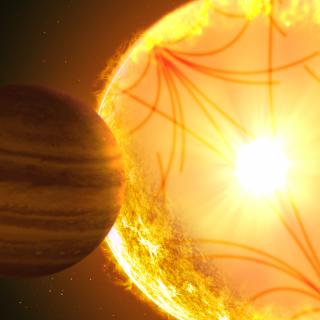Bibcode
Mathur, Savita; Howe, Rachel; García, Rafael A.; Elsworth, Yvonne; Chaplin, William J.; Salabert, David; Broomhall, Anne-Marie
Referencia bibliográfica
Monthly Notices of the Royal Astronomical Society, Volume 422, Issue 4, pp. 3564-3573.
Fecha de publicación:
6
2012
Número de citas
4
Número de citas referidas
2
Descripción
The aim of this paper is to investigate whether there are any 11-yr or
quasi-biennial solar-cycle-related variations in solar rotational
splitting frequencies of low-degree solar p modes. Although no 11-yr
signals were observed, variations on a shorter time-scale (˜2 yr)
were apparent. We show that the variations arose from
complications/artefacts associated with the realization noise in the
data and the process by which the data were analysed. More specifically,
the realization noise was observed to have a larger effect on the
rotational splittings than accounted for by the formal uncertainties.
When used to infer the rotation profile of the Sun these variations are
not important. The outer regions of the solar interior can be
constrained using higher degree modes. While the variations in the low-l
splittings do make large differences to the inferred rotation rate of
the core, the core rotation rate is so poorly constrained, even by low-l
modes, that the different inferred rotation profiles still agree within
their respective 1σ uncertainties. By contrast, in
asteroseismology, only low-l modes are visible and so higher l modes
cannot be used to constrain the rotation profile of stars. Furthermore,
we usually only have one data set from which to measure the observed
low-l splitting. In such circumstances the inferred internal rotation
rate of a main-sequence star could differ significantly from estimates
of the surface rotation rate, hence leading to spurious conclusions.
Therefore, extreme care must be taken when using only the splittings of
low-l modes to draw conclusions about the average internal rotation rate
of a star.
Proyectos relacionados

Sismología Solar y Estelar y Búsqueda de Exoplanetas
Los objetivos genéricos de este Proyecto son: 1) el estudio de la estructura y dinámica del interior solar, 2) la extensión de dicho estudio al caso de otras estrellas, 3) la búsqueda y caracterización de planetas extrasolares por métodos fotométricos (principalmente mediante el método de tránsitos) y espectroscópico (variaciones en la velocidad
Savita
Mathur